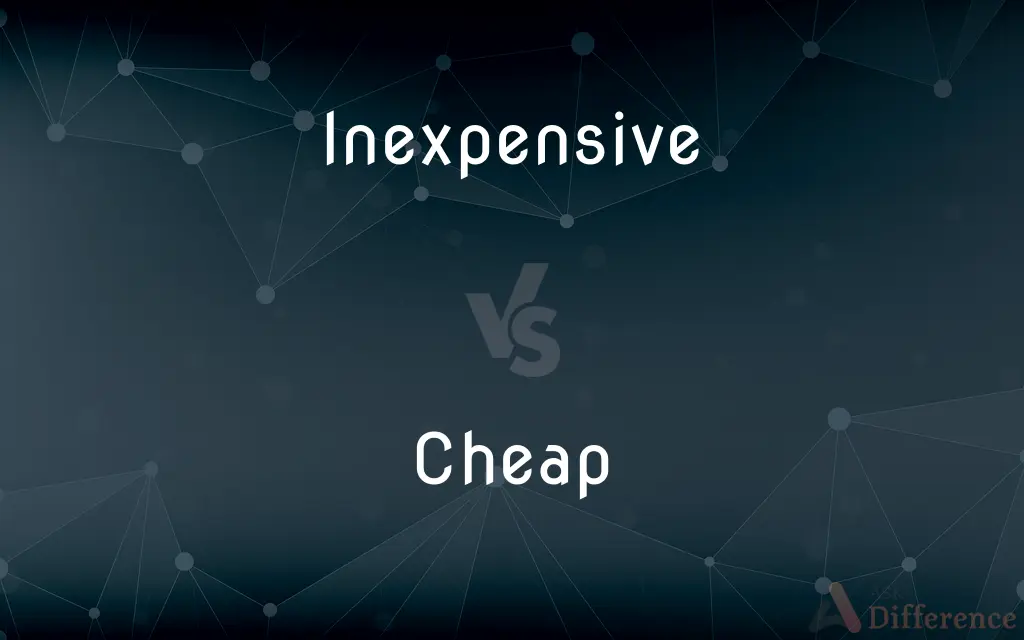Inexpensive vs. Cheap — What's the Difference?
By Maham Liaqat & Urooj Arif — Updated on March 8, 2024
Inexpensive implies value at a low cost, while cheap suggests lower quality and worth.

Difference Between Inexpensive and Cheap
Table of Contents
ADVERTISEMENT
Key Differences
Inexpensive items are often seen as affordable without compromising quality. They provide a good balance between cost and value, making them a preferred choice for budget-conscious consumers who do not want to sacrifice quality. On the other hand, cheap items are typically associated with lower quality and durability. The term "cheap" can carry a negative connotation, suggesting that the low cost comes at the expense of quality and longevity.
While inexpensive products are designed to offer value for money, ensuring that consumers receive a satisfactory product at a lower price, cheap products may cut corners in materials, craftsmanship, or features to achieve a lower price point. This distinction highlights how consumers perceive the quality and value of products based on their pricing and the terms used to describe them.
In the market, inexpensive items are strategically priced to attract buyers looking for deals that do not compromise on quality. These products are often part of promotions or discounts from reputable brands aiming to offer value to their customers. In contrast, cheap items might be the result of cost-saving measures in production, leading to an inferior product that is sold at a low price to attract less discerning buyers.
Quality perception plays a significant role in distinguishing between inexpensive and cheap items. Inexpensive products maintain a level of quality that reassures buyers of their investment, while cheap products may raise concerns about their effectiveness or longevity, leading to potential dissatisfaction.
Comparison Chart
Cost
Low, but offers good value for the price.
Low, potentially at the expense of quality.
ADVERTISEMENT
Quality Perception
Generally positive, seen as budget-friendly.
Often negative, associated with poor quality.
Durability
Reasonably durable for the price.
May have compromised durability.
Target Market
Budget-conscious consumers valuing quality.
Price-sensitive consumers less concerned with quality.
Connotation
Positive, smart purchase.
Negative, indicative of poor value.
Compare with Definitions
Inexpensive
Affordably priced without sacrificing quality.
The store offers an inexpensive range of kitchen appliances that last for years.
Cheap
Low in price and often in quality.
The cheap toy broke within a day of purchase.
Inexpensive
Lower in price, suitable for a budget.
The inexpensive meal plans helped students save money without skimping on nutrition.
Cheap
Inexpensively made, reflecting poor craftsmanship.
The shelves were cheap and wobbled under the weight of the books.
Inexpensive
Not costly, yet satisfactory in quality.
She bought an inexpensive dress for the party, and it looked stunning.
Cheap
Priced low to attract buyers, but with hidden compromises.
The cheap flight tickets came with so many restrictions that they weren't worth it.
Inexpensive
Economical, but reliable.
The software offers an inexpensive solution for small businesses looking to manage their accounts efficiently.
Cheap
Offering little value, despite the low cost.
The cheap meal deal turned out to be unsatisfying and bland.
Inexpensive
Cost-effective, providing good value.
He found an inexpensive hotel that was both comfortable and well-located.
Cheap
Economical to a fault, leading to potential issues.
Buying cheap electronics often means dealing with frequent malfunctions.
Inexpensive
Not high in price; cheap.
Cheap
Low in price, especially in relation to similar items or services
Local buses were reliable and cheap
Inexpensive
Low in price
Cheap
Of little worth because achieved in a discreditable way requiring little effort
Her moment of cheap triumph
Inexpensive
Not expensive; cheap.
Cheap
At or for a low price
A house that was going cheap because of the war
Inexpensive
Relatively low in price or charging low prices;
It would have been cheap at twice the price
Inexpensive family restaurants
Cheap
Relatively low in cost; inexpensive or comparatively inexpensive.
Cheap
Charging low prices
A cheap restaurant.
Cheap
Obtainable at a low rate of interest. Used especially of money.
Cheap
Devalued, as in buying power
Cheap dollars.
Cheap
Achieved with little effort
A cheap victory.
Cheap laughs.
Cheap
Of or considered of small value
In wartime, when life was cheap.
Cheap
Of poor quality; inferior
A cheap toy.
Cheap
Worthy of no respect; vulgar or contemptible
A cheap gangster.
Cheap
Stingy; miserly.
Cheap
Inexpensively
Got the new car cheap.
Cheap
(obsolete) Trade; traffic; chaffer; chaffering.
Cheap
(obsolete) A market; marketplace.
Cheap
Price.
Cheap
(obsolete) A low price; a bargain.
Cheap
Cheapness; lowness of price; abundance of supply. en
Cheap
Low and/or reduced in price.
Cheap
Of poor quality.
Cheap
Of little worth.
Cheap
Underhand or unfair.
The cheap trick of hiding deadly lava under pushable blocks
Cheap
Stingy; mean; excessively frugal.
Insurance is expensive, but don't be so cheap that you risk losing your home because of a fire.
Cheap
(finance) Trading at a price level which is low relative to historical trends, a similar asset, or (for derivatives) a theoretical value.
The ETF is trading cheap to NAV right now; we can arb this by buying the ETF and selling the underlying constituents.
Cheap
To trade; traffic; bargain; chaffer; ask the price of goods; cheapen goods.
Cheap
To bargain for; chaffer for; ask the price of; offer a price for; cheapen.
Cheap
To buy; purchase.
Cheap
To sell.
Cheap
Cheaply.
Cheap
A bargain; a purchase; cheapness.
The sack that thou hast drunk me would have bought me lights as good cheap at the dearest chandler's in Europe.
Cheap
Having a low price in market; of small cost or price, as compared with the usual price or the real value.
Where there are a great sellers to a few buyers, there the thing to be sold will be cheap.
Cheap
Of comparatively small value; common; mean.
You grow cheap in every subject's eye.
Cheap
Cheaply.
Cheap
To buy; to bargain.
Cheap
Relatively low in price or charging low prices;
It would have been cheap at twice the price
Inexpensive family restaurants
Cheap
Tastelessly showy;
A flash car
A flashy ring
Garish colors
A gaudy costume
Loud sport shirts
A meretricious yet stylish book
Tawdry ornaments
Cheap
Of very poor quality
Cheap
Embarrassingly stingy
Common Curiosities
What are the risks of buying cheap items?
The risks include lower quality, reduced durability, and potentially higher long-term costs due to replacements.
Can an inexpensive item be of good quality?
Yes, inexpensive items can be of good quality, offering a balance between affordability and value.
Why do people prefer inexpensive items over cheap ones?
People prefer inexpensive items as they offer a better balance of cost and quality, ensuring value for money.
Can expensive items be considered cheap in terms of quality?
Yes, if an expensive item lacks in quality or durability, it can be considered cheap in terms of value.
How can consumers identify if a product is inexpensive or cheap?
By evaluating the product's price in relation to its quality, brand reputation, and customer reviews.
What defines an item as inexpensive?
An item is defined as inexpensive if it is low in price but still offers good value and quality.
Are all low-priced items considered cheap?
Not necessarily; the term cheap specifically refers to items that compromise on quality, not just low-priced items.
Can cheap items be a smart purchase?
In some cases, if the buyer's needs are minimal and the product meets those needs adequately.
Can an item start as inexpensive and become cheap over time?
Yes, if the quality degrades over time or newer, better alternatives become available at similar prices.
How does a cheap item differ from an inexpensive one?
A cheap item is low in price but often compromises on quality and durability, unlike an inexpensive item which maintains value.
Is it always better to buy inexpensive items?
It depends on the individual's needs and the item's intended use; sometimes, investing more for quality is beneficial.
How do brands market inexpensive products?
Brands highlight the value, quality, and durability of their products, emphasizing their affordability.
Do inexpensive items last as long as more expensive ones?
While they can be durable, they might not always last as long as higher-priced, premium-quality items.
How does consumer perception affect the classification of inexpensive vs. cheap?
Consumer perception is crucial, as it's based on personal experiences, quality expectations, and value for money.
Why is it important to distinguish between inexpensive and cheap items?
It helps consumers make informed decisions based on value, quality, and long-term satisfaction.
Share Your Discovery

Previous Comparison
Winde vs. Wind
Next Comparison
Through vs. ViaAuthor Spotlight
Written by
Maham LiaqatCo-written by
Urooj ArifUrooj is a skilled content writer at Ask Difference, known for her exceptional ability to simplify complex topics into engaging and informative content. With a passion for research and a flair for clear, concise writing, she consistently delivers articles that resonate with our diverse audience.














































